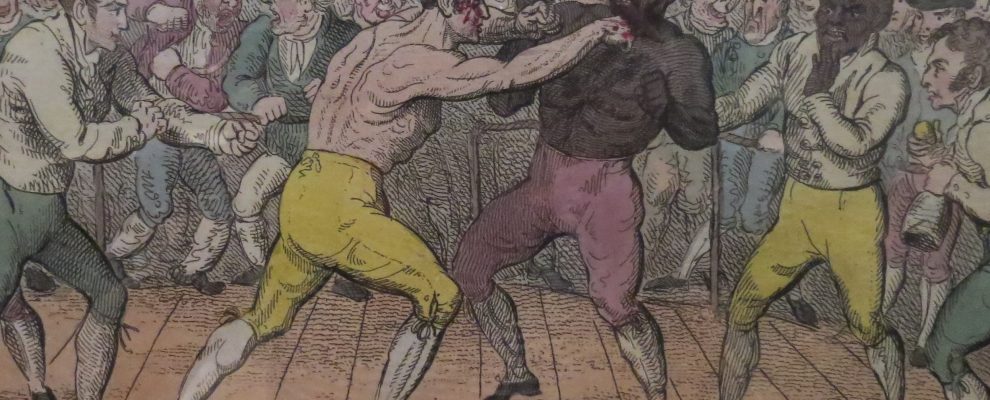Boxing, in its organised form as prize fighting, was immensely popular throughout the eighteenth century. Matches tended to take place alongside race meetings, where there was a ready assembly of spectators and those eager to gamble – though cudgel fights and wrestling were common attractions at fairs and wakes. Prize winnings could be substantial for the victor and huge sums were often gambled at matches. For example, at a widely publicised fight at New Market in 1786, which was patronised by the Prince of Wales and the Duke of York, between £30000 and £40000 was wagered.
Boxing matches, as one critic writing for the York Chronicle in 1823 described, were ‘the carnival of England’ where upon ‘the distinctions of rank are laid aside; the decencies of society forgotten’. The critic also noted that ‘displays of boxing, and even more furious games of the common people, such as bull baiting, have long since been advocated as tending to keep up the manliness of the English character’. Whilst for this writer boxing was explicitly associated with masculine agility and aggression, female prize fighters were not uncommon in the period. Elizabeth Wilkinson-Stokes, who fought in London in the 1720s, is perhaps the most well-known female fighter. Wilkinson-Stokes fought women and men, and frequently paired up with her husband to fight against other couples.
There were few large scale boxing matches organised in York in the period, though the city could boast its very own boxing legend in the form of Bill Richmond. Richmond was born to enslaved Georgia-native parents in 1763 on Staten Island, New York. A British officer in New York City took him under his wing and sent him to school in Yorkshire, later apprenticing him to a cabinet maker in York. Richmond became a professional boxer when he moved to London around 1804 and went on to a series of victories. Richmond also trained another former slave and future famous boxer Tom Molineaux, whose fight with Tom Cribb in 1810 drew crowds of over 20,000 people.

Source: In Pursuit of Pleasure: Entertaining Georgian Polite Society (Fairfax House, 2016)
